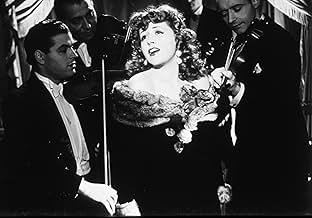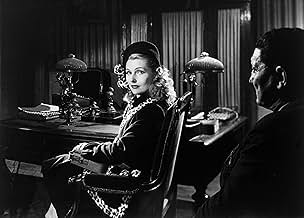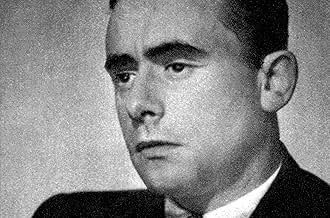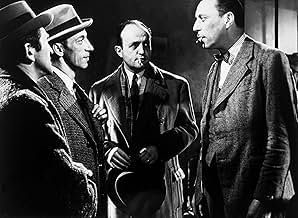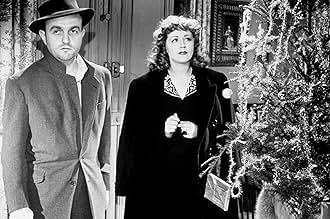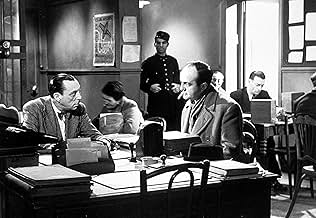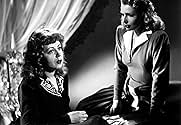AVALIAÇÃO DA IMDb
7,7/10
6,7 mil
SUA AVALIAÇÃO
Um marido ciumento pretende matar o homem que sua esposa está encontrando para negócios, mas chega e descobre que a ação já está feita.Um marido ciumento pretende matar o homem que sua esposa está encontrando para negócios, mas chega e descobre que a ação já está feita.Um marido ciumento pretende matar o homem que sua esposa está encontrando para negócios, mas chega e descobre que a ação já está feita.
- Direção
- Roteiristas
- Artistas
- Prêmios
- 2 vitórias e 1 indicação no total
Henri Arius
- Léopardi
- (as Arius)
Charles Blavette
- Le gendarme Poitevin
- (as Blavette)
René Blancard
- Le commissaire principal de la P.J.
- (as R. Blancard)
Robert Dalban
- Paulo
- (as R. Dalban)
Jean Daurand
- L'inspecteur Picard
- (as J. Daurand)
Jean Dunot
- Nitram
- (as J. Dunot)
Jacques Grétillat
- Auguste
- (as J. Grétillat)
Gilberte Géniat
- Mme Beauvoir
- (as G. Géniat)
Gabriel Gobin
- Le patron du bistrot
- (as G. Gobin)
François Joux
- L' officier de police Fayard
- (as F. Joux)
Avaliações em destaque
First of all,there is a detective story:"légitime défense" by Belgian Stanislas André Steeman whose "l'assassin habite au 21" Clouzot had already transferred to the screen in 1942,with Pierre Fresnay and the same actress Suzy Delair.Steeman complained about Clouzot's adaptation for both movies.The movie from 1942 was excellent,but the "detective story" side had been kept,so why complaining?As for "Quai des orfèvres",Clouzot was now in a new phase of his brilliant career.After having directed "le corbeau" and been blacklisted,he had a lot more to say than a simple whodunit.Steeman complained essentially about the poor detective ending,which I will not reveal of course,but Clouzot focused on the social vignettes,on his characters's psychology,and he did not give a damn about the puzzle à la Agatha Christie.By doing so,he becomes the genuine predecessor of CLaude Chabrol who has always been closer to him than to Alfred Hitchcock whom he admires much though. Suzy Delair has great screen presence,and you will love the song she really sings(she was a singer too)"avec son tralala".Bernard Blier gives ,as ever,a sparing of gestures and words performance,and he really pulls it off .Two characters are particularly interesting and disturbing:the first one,Dora,the photographer:she takes pictures of female models ,and Clouzot,by subtle touches,reveals us she's a lesbian.Of course,the word is never uttered(How could it be in 1947?) The police chief (fabulous Louis Jouvet) tells her:"You and me,WE are not lucky with women."The portrait of this cop is very detailed:we learn a lot of things about him,not necessarily connected with the Delair/Blier plot:he's a widower ,with a son he adores and who runs into school difficulties,particularly in geometry.So we get to know all the characters in depth.One of the most important manifesto of post-war French cinema.
H.G. Cluozot had difficulties working in France after he had made "Le Corbeau" in 1943 which was produced by the German company and later judged by French as a piece of anti-French propaganda. Louis Jouvet, an admirer of Clouzot's work, invited him to direct a thriller "Quai des Orfevres" where he played an ambiguous police inspector investigating a murder that happened in Paris Music Hall. Without each other knowledge, the seductive cabaret singer Jenny Lamoure (Suzy Delair) and her jealous piano-accompanist husband Maurice who is madly in love with her (Bertrand Blier, father of director Bertrand Blier) trying to cover up (without each other's knowledge) what they believe to be their involvement in the murder? Enters tenacious policeman (Louis Jouvet) who is determined to discover the truth. Jouvet practically stole the movie with wonderfully cynic and sentimental in the same time performance. "His character, his eagle-like profile and his unique way of speaking made him unforgettable." "Quai des Orfevres", witty and atmospheric observation of human weaknesses was a great comeback of H.G. Cluozot, the fine director, "French Hitchcock".
The extraordinarily adorable Suzy Delair plays a statuesque performer obsessed with succeeding in the theater. Her husband and accompanist, played by Bernard Blier, is a composed but jealous man. When he finds out in a less than preferable way that his flashy wife has planned a rendezvous with a lecherous old businessman with the intention of advancing her career, he loses all control and threatens the businessman with murder. Now, at that point, I must stop describing the film to you because it skates on such thin ice with its twists, revelations, ambiguities and suspense that to imply any of it would endanger it. I am not sure how good or bad that is for this French police procedural emanating from the song- and-dance community, though it is certainly interesting that what we do know throughout is who did not do it. We just don't know who did.
The story depends upon the procedure of following clues, where ideal alibis fail and where cautiously created fabrications and deceptions disintegrate. Interestingly, this is a suspense film in which suspense is generated in spite of the knowledge one would traditionally think too much too soon.
Quay of the Goldsmiths is the least dark of Henri-Georges Clouzot's films. It's nowhere near as sinister as the shocking Les Diaboliques, as tragic as the riveting Wages of Fear or as eery as Le Corbeau. Maybe it is due to the vibrance of the dance halls and theater settings of 1940s France, which all work as the milieu of this crime thriller.
Clouzot both understands and approves of his characters, even the more rotten ones, where he has more of a vindictive streak with his other films. Where he may have had understanding for the scheming women in Les Diabolique or the truck drivers who sink to the level of risking horrible death in order to oust themselves from miserable life in The Wages of Fear, there isn't necessarily support or agreement on the part of the filmmaker, for these are characters who plainly made the direct decisions that determine their fate. All the characters in this more settling film have scenes and moments that endear us to them, even the harsh, cold detective played by Louis Jouvet, who worries about his young adoptive son amid all the trouble and despair that happens in his life at any time with the drop of a hat.
There is humor and unabashed sexiness, the latter mostly on the part of Delair, that neutralize the pressure to a degree. Clouzot was quietly practicing his craft, patient till he made his unrelenting later films, in which he would permit his audiences no pardon from the tension.
The story depends upon the procedure of following clues, where ideal alibis fail and where cautiously created fabrications and deceptions disintegrate. Interestingly, this is a suspense film in which suspense is generated in spite of the knowledge one would traditionally think too much too soon.
Quay of the Goldsmiths is the least dark of Henri-Georges Clouzot's films. It's nowhere near as sinister as the shocking Les Diaboliques, as tragic as the riveting Wages of Fear or as eery as Le Corbeau. Maybe it is due to the vibrance of the dance halls and theater settings of 1940s France, which all work as the milieu of this crime thriller.
Clouzot both understands and approves of his characters, even the more rotten ones, where he has more of a vindictive streak with his other films. Where he may have had understanding for the scheming women in Les Diabolique or the truck drivers who sink to the level of risking horrible death in order to oust themselves from miserable life in The Wages of Fear, there isn't necessarily support or agreement on the part of the filmmaker, for these are characters who plainly made the direct decisions that determine their fate. All the characters in this more settling film have scenes and moments that endear us to them, even the harsh, cold detective played by Louis Jouvet, who worries about his young adoptive son amid all the trouble and despair that happens in his life at any time with the drop of a hat.
There is humor and unabashed sexiness, the latter mostly on the part of Delair, that neutralize the pressure to a degree. Clouzot was quietly practicing his craft, patient till he made his unrelenting later films, in which he would permit his audiences no pardon from the tension.
Henri-Georges Clouzot's "Quai des Orfevres" (1947) stars Suzy Delair, Bernard Blier, Louis Jouvet, and Charles Dullin. The story takes place in post-war Paris, where an accompanist, Maurice Martineau (Blier) lives with his singer wife, Marguerite, better known as Jenny Lamour (Suzy Delair). An important man, Georges Brignon (Dullin) promises Jenny work, and because she's ambitious, she flirts with him. Maurice is an extremely jealous man, so he finds Brignon in a restaurant and threatens him.
Later on, Jenny tells Maurice she is visiting her grandmother, who lives in another town. This gives Maurice a good opportunity to bump off Brignon, especially when he finds the man's address on a piece of paper in the kitchen and realizes Jenny was lying. But when he gets to Brignon's house, Brignon is already dead.
Inspector Antoine (Juvet) is assigned to the case, and it doesn't take him long to realize that some alibis aren't very secure.
Wonderful film, with the excellent Juvet outstanding as Inspector Antoine, and an excellent performance by Simone Renant as a lesbian photographer, Dora, in love with Jenny. Delair, who was involved with Clouzot, is good as a lower-class woman who loves her husband but wants to get ahead in show business as well.
This is Clouzot at his best, with a witty script with some plot twists and a true Parisian atmosphere.
Later on, Jenny tells Maurice she is visiting her grandmother, who lives in another town. This gives Maurice a good opportunity to bump off Brignon, especially when he finds the man's address on a piece of paper in the kitchen and realizes Jenny was lying. But when he gets to Brignon's house, Brignon is already dead.
Inspector Antoine (Juvet) is assigned to the case, and it doesn't take him long to realize that some alibis aren't very secure.
Wonderful film, with the excellent Juvet outstanding as Inspector Antoine, and an excellent performance by Simone Renant as a lesbian photographer, Dora, in love with Jenny. Delair, who was involved with Clouzot, is good as a lower-class woman who loves her husband but wants to get ahead in show business as well.
This is Clouzot at his best, with a witty script with some plot twists and a true Parisian atmosphere.
It takes a while for the scene to set, a subtle intriguing build up, just as you'd expect, but where is it going, this to-ing and fro-ing, as the alibis and excuses unwind and reset? To somewhere quite unexpected is the answer.
Você sabia?
- CuriosidadesHenri-Georges Clouzot wrote almost two-thirds of the film only having read the novel years before, recalling it from memory, since it was out of print by the time he started the screenplay. When the novelist Stanislas-André Steeman saw the film, he was furious about the differences between the novel and the film.
- Erros de gravaçãoWhen Antoine is repeating Maurice's deposition to the typist, he says that the confrontation between Maurice and Brignon at the restaurant took place on Wednesday, December 2, 1946. In 1946, December 2 fell on a Monday.
- Citações
L'inspecteur adjoint Antoine: I have to admit, I've taken a liking to you, Miss Dora Monier.
Dora Monier: Me?
L'inspecteur adjoint Antoine: Because I have to say, you're just my type. When it comes to women, we'll never have a chance.
- ConexõesEdited into Histoire(s) du cinéma: La monnaie de l'absolu (1999)
Principais escolhas
Faça login para avaliar e ver a lista de recomendações personalizadas
- How long is Jenny Lamour?Fornecido pela Alexa
Detalhes
- Data de lançamento
- País de origem
- Central de atendimento oficial
- Idioma
- Também conhecido como
- Jenny Lamour
- Locações de filme
- Paris, França(Exterior)
- Empresa de produção
- Consulte mais créditos da empresa na IMDbPro
Bilheteria
- Faturamento bruto nos EUA e Canadá
- US$ 180.974
- Fim de semana de estreia nos EUA e Canadá
- US$ 9.632
- 27 de out. de 2002
- Faturamento bruto mundial
- US$ 181.041
- Tempo de duração
- 1 h 46 min(106 min)
- Cor
- Proporção
- 1.37 : 1
Contribua para esta página
Sugerir uma alteração ou adicionar conteúdo ausente

![Assistir a Bande-annonce [OV]](https://m.media-amazon.com/images/M/MV5BMmI1MGQ3ZWItMWI3Yi00M2RhLTkwMzEtODUyZWE5NmVhZGRlXkEyXkFqcGdeQXRyYW5zY29kZS13b3JrZmxvdw@@._V1_QL75_UX500_CR0)
